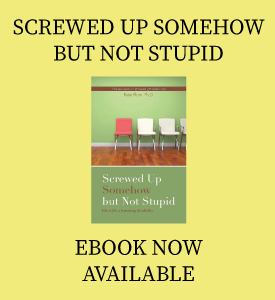Disabilities can certainly be inconvenient. In fact, you might even say that if something isn’t inconvenient it isn’t a disability. But disabilities aren’t just inconvenient and many inconveniences aren’t disabilities. What are the similarities and differences?
Disabilities are permanent or, at least, long term. Inconveniences are short term. So, a disability keeps on producing inconveniences, but many inconveniences aren’t produced by disabilities. For example, my disability (nonverbal learning disability or NLD or NVLD) includes me getting lost a lot. So:
“The store is closed. How inconvenient!” – inconvenient but not related to disability.
“I thought the store was on Main St., but it turns out to be on Oak St.” – inconvenient, possibly related to disability.
“I can’t find the store! I was just there yesterday! Where the **** is Oak St. anyway?” – disability producing inconvenience.
Disabilities are, for want of a better word, personal. Inconveniences are universal. That is, everyone is inconvenienced sometimes, but only some people are disabled. So:
“I can’t read that! It’s printed in Urdu! Why don’t they have an English translation?” – inconvenient, not related to disability.
“I can’t read that, the print is too small.” – inconvenience, possibly related to disability (e.g. nearsightedness)
“I can’t read. I have severe dyslexia” – disability producing inconvenience.
Disabilities are general, inconveniences are specific. That is, a disability produces inconveniences over a range of situations, but each inconvenience is specific. So:
“I can’t figure out how to get to the store, I lost my map” – inconvenient, not related to disability
“I can’t figure out how to get to the store, I just forget the directions” – inconvenient, possibly related to disability
“I can’t figure out how to get to the store; if I did get there, I wouldn’t be able to figure out how to get home. And even if I got home, I wouldn’t be able to figure out how to get to the store tomorrow. And I can’t figure out how to get to my friend’s house. Or how to get to the train station.” – inconvenience produced by disability



Do you have that directional disability? (“Where the **** is Oak Street?”) Dr. John Toker, a beautiful man who taught Special Education classes brilliantly at the school I went to (UNK) would get lost driving from his house to the college, every day. Every day he had to find his way from the parking lot to his classroom.
His heart, however, was totally undisabled. I don’t know how to describe how unfailingly kind and encouraging he was. Everyone who knew him loved him. He was very intelligent, also. His disability made him so humane to others. So it seemed what he may have lacked was made up for in abundance in another area. I wonder, if when we accept ourselves WITH our disabilities instead of IN SPITE of our disabilities, this happens.